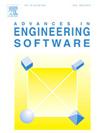基于非等距灰色预测进化的未来信息复合粒子群优化算法用于全局优化问题和工程问题
IF 5.7
2区 工程技术
Q2 COMPUTER SCIENCE, INTERDISCIPLINARY APPLICATIONS
引用次数: 0
摘要
粒子群优化(PSO)是一种基于群体信息协同共享的随机优化技术。许多变体将当前粒子和历史粒子作为当前和历史信息,以提高它们的性能。如果能够挖掘每个当前群之后的未来信息参与协同搜索,则算法性能将受益于信息的全面性,包括历史信息、当前信息和未来信息。本文提出了一种基于非等距灰色预测进化的未来信息复合粒子群优化算法——neppso。该算法首先采用非等距灰色预测进化算法预测一个未来粒子作为当前群中每个粒子的未来信息;其次,利用当前群体的预测粒子、粒子最佳和群体最佳4个粒子以及历史记忆粒子作为引导粒子,生成4个候选位置;最后,贪婪地选择四个位置中最优的一个作为子代粒子。对进化计算大会2014/2022给出的42个基准函数和3个工程问题进行了数值实验。实验结果表明,该算法相对于几种最先进的算法具有总体优势。本文章由计算机程序翻译,如有差异,请以英文原文为准。
A composite particle swarm optimization algorithm with future information inspired by non-equidistant grey predictive evolution for global optimization problems and engineering problems
Particle swarm optimization (PSO) and its numerous performance-enhancing variants are a kind of stochastic optimization technique based on collaborative sharing of swarm information. Many variants took current particles and historical particles as current and historical information to improve their performance. If future information after each current swarm can be mined to participate in collaborative search, the algorithmic performance could benefit from the comprehensiveness of the information including historical, current and future information. This paper proposes a composite particle swarm optimization algorithm with future information inspired by non-equidistant grey predictive evolution, namely NeGPPSO. The proposed algorithm firstly employs non-equidistant grey predictive evolution algorithm to predict a future particle as future information for each particle of a current swarm. Secondly, four particles including prediction particle, particle best and swarm best of the current swarm, and a history memory particle are used as guide particles to generate four candidate positions. Finally, the best one in the four positions is greedily selected as an offspring particle. Numerical experiments are conducted on 42 benchmark functions given by the Congress on Evolutionary Computation 2014/2022 and 3 engineering problems. The experimental results demonstrate the overall advantages of the proposed NeGPPSO over several state-of-art algorithms.
求助全文
通过发布文献求助,成功后即可免费获取论文全文。
去求助
来源期刊

Advances in Engineering Software
工程技术-计算机:跨学科应用
CiteScore
7.70
自引率
4.20%
发文量
169
审稿时长
37 days
期刊介绍:
The objective of this journal is to communicate recent and projected advances in computer-based engineering techniques. The fields covered include mechanical, aerospace, civil and environmental engineering, with an emphasis on research and development leading to practical problem-solving.
The scope of the journal includes:
• Innovative computational strategies and numerical algorithms for large-scale engineering problems
• Analysis and simulation techniques and systems
• Model and mesh generation
• Control of the accuracy, stability and efficiency of computational process
• Exploitation of new computing environments (eg distributed hetergeneous and collaborative computing)
• Advanced visualization techniques, virtual environments and prototyping
• Applications of AI, knowledge-based systems, computational intelligence, including fuzzy logic, neural networks and evolutionary computations
• Application of object-oriented technology to engineering problems
• Intelligent human computer interfaces
• Design automation, multidisciplinary design and optimization
• CAD, CAE and integrated process and product development systems
• Quality and reliability.
 求助内容:
求助内容: 应助结果提醒方式:
应助结果提醒方式:


